June 26, 2025
How Chicago Educators Led the Charge for an Equitable School Board
Dr. Marlena Little • Executive Director, E4E-Chicago
I’m incredibly proud of E4E-Chicago educators and their powerful advocacy this school year. Building on last year’s wins—like securing more equitable maps for Chicago’s new 21-member hybrid school board and codifying the Black Student Achievement Committee into state law—educators didn’t let up. They doubled down and made sure that passing a law wasn’t the end of the story.
They held the school board accountable for implementing the Black Student Achievement Committee with fidelity, ensuring educators have a seat at the table and that the committee delivers real student results.
Urgency intensified in February, when an out-of-state group filed a federal complaint attacking Chicago’s Black Student Success Plan—a separate but related equity initiative. This attack was part of a disturbing national trend of efforts to roll back diversity and equity in schools. Educators knew that if we didn’t act fast, the Black Student Achievement Committee could be next. Black students, who have long been systematically underinvested in, couldn’t afford another delay.
So E4E-Chicago educators organized. They formed teacher teams, circulated petitions, testified before the school board, and won. The board ultimately sided with educators and followed through.
Now, the Black Student Achievement Committee isn’t just an idea on paper. It’s a reality—one that exists because of the determination, urgency, and leadership of Chicago’s teachers. Here’s a story about how they did it.
August: Summer Policy Institute Lays the Groundwork
In August 2024, E4E-Chicago hosted its Summer Policy Institute, where teacher leaders launched the foundation for what became the Educators’ Agenda—a teacher-led policy framework to guide the incoming elected school board’s priorities.
Grounded in E4E’s National Policy Agenda, this locally tailored effort was the first step toward ensuring education policy reflects the expertise of those closest to students.
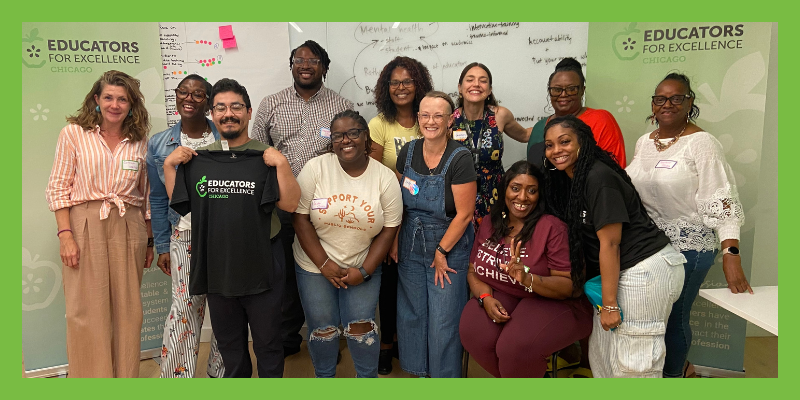
September: Teachers Weigh In Through Focus Groups
After the Summer Policy Institute, educators facilitated a series of focus groups across the city, gathering authentic input from colleagues. These conversations surfaced key issues on educators’ minds: school funding equity, teacher retention, and student mental health. With insights in hand from over 130 educators across a dozen focus groups, E4E-Chicago laid the foundation for a shared vision for Chicago’s public schools.
October: Get Out the Vote (GOTV)
With school board elections on the horizon, advancing the Educators’ Agenda meant first electing student-centered board members. E4E-Chicago launched a citywide GOTV campaign to help historically underrepresented communities access critical voting information.
Educators collected voter commitment cards, partnered with parents and community groups, and launched a state-of-the-art website to help Chicagoans understand the election and what it meant for the future of education in Chicago.
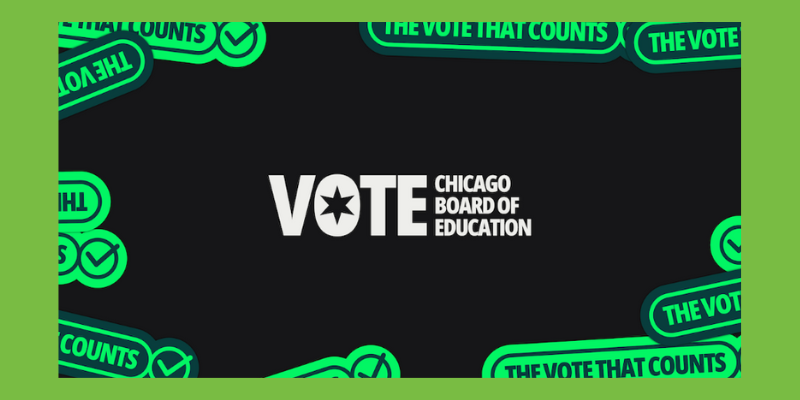
Partners like IAAFER, Kids First, and Chicago Votes joined the effort, helping to break down barriers to civic engagement and awareness of the election. Post-election, educators began assessing how the new board aligned with the Educators’ Agenda and prepared for next steps.
November & December: The Educators’ Agenda Advances
Taking the top five policy priorities from the Educators’ Agenda, backed by the focus group data, E4E-Chicago presented the priorities to the newly elected board in January.
Educator engagement didn’t stop there. At E4E-Chicago’s annual Winter Celebration, more teachers got a first look at the priorities and celebrated the progress made.

January: The Black Student Achievement Committee Takes Focus
With the new board seated and the Educators’ Agenda released, educators launched a petition urging the board to implement their recommendations, focusing on a demand that the Black Student Achievement Committee be established.
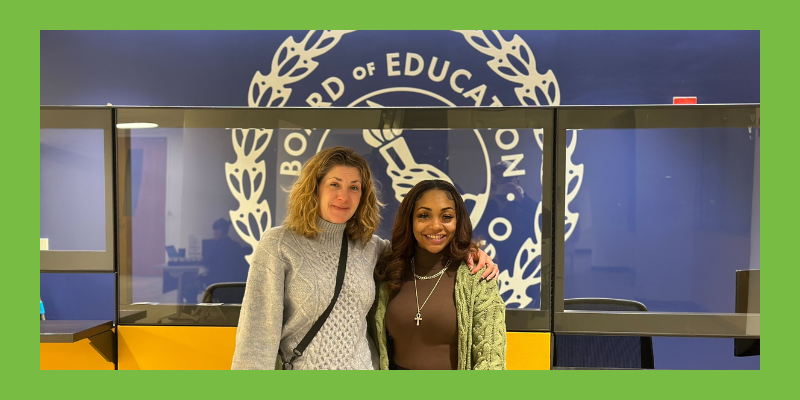
Through petitions, direct outreach to board members, and continued conversations with colleagues, educators elevated this issue to the top of the agenda.
February: Educators Speak Out
When the school board met in February, the Black Student Achievement Committee wasn’t even on the agenda. But that didn’t stop E4E educators from making it happen. Leaders like Shana Wrencher, Delanie Preston, and Dr. Winnie Williams-Hall showed up and spoke out—demanding immediate action from the Board.
Their calls for action and results worked. Board Member Jitu Brown responded in real time, pledging to introduce a resolution to establish the committee.
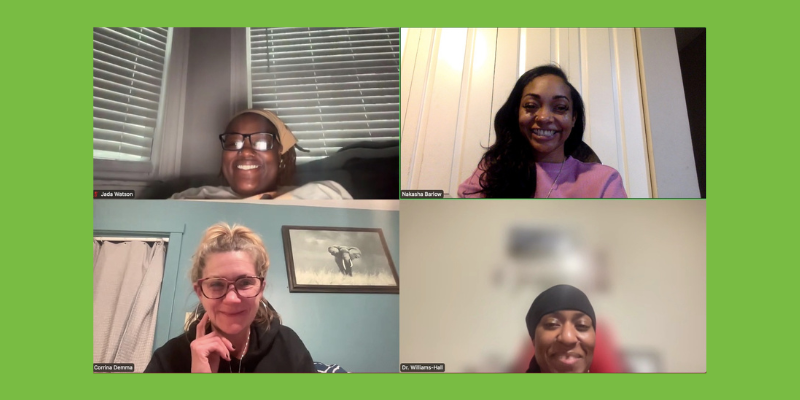
March: The Media Takes Notice
After months of delays, educators brought the story to the press. E4E-Chicago prepared testimony and public statements for the March board meeting, calling out the continued inaction.
With media present, Nakasha Barlow testified powerfully—and Jitu Brown doubled down on his public commitment: “Please hold us accountable for the Black Student Achievement Committee. Just know we are moving diligently to get it up and running.”
The moment was captured in an early April Chalkbeat story.
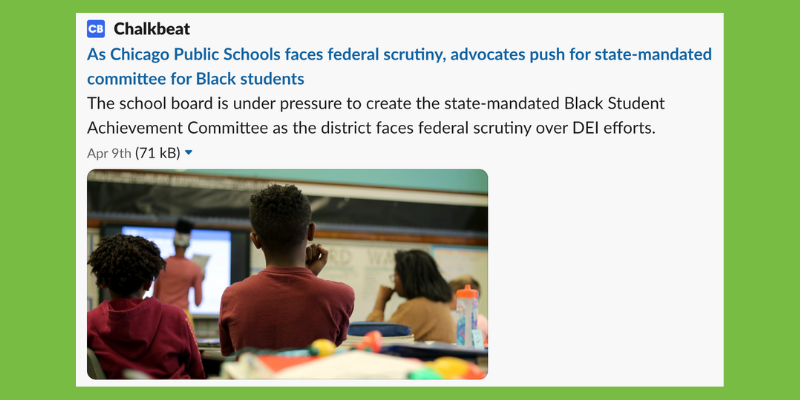
April: The Committee Is Announced
Just two weeks after the Chalkbeat story, the school board officially established the Black Student Achievement Committee—a long-overdue but hard-won victory for equity in Chicago Public Schools.
Mandated by state law (SB15), the committee had been stalled for months. It finally moved forward thanks to months of relentless educator advocacy—including public testimony and more than 100 petition signatures from E4E-Chicago members.
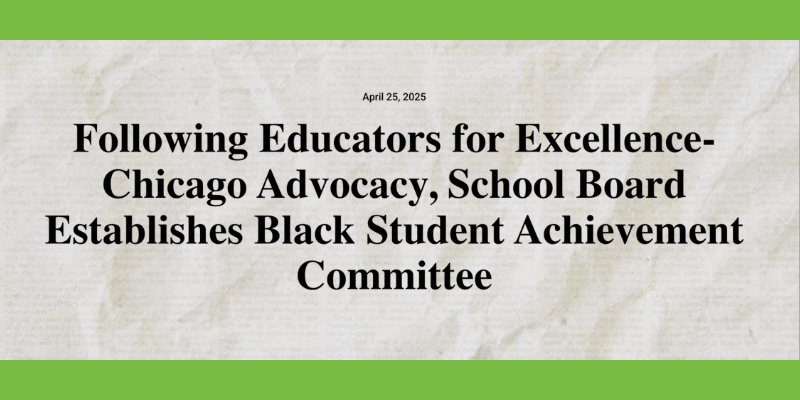
Establishing the Black Student Achievement Committee was a major win for Chicago! As federal attacks on equity gain momentum—even impacting local efforts like Chicago’s Black Student Success Plan—it became more urgent than ever to ensure the Black Student Achievement Committee was not only established, but protected.
That’s why we’re keeping the momentum going, partnering with Kids First Chicago to fight back. We recently co-hosted two webinars that equipped Chicago educators, parents, and community stakeholders with the tools and knowledge they need to stand strong against any attacks against advancing equity in our schools.
WEBINAR 1: IMPACT OF FEDERAL ACTIONS ON CHICAGO
WEBINAR 2: IMPACT OF FEDERAL ACTIONS ON CHICAGO
What’s Next?
The establishment of the Black Student Achievement Committee is a major win and a testament to the power of educator advocacy. But the work doesn’t stop here. While the committee has been created, we now need the Chicago School Board to appoint members so it can begin serving the needs of Black students.
TELL THE SCHOOL BOARD: APPOINT BLACK STUDENT ACHIEVEMENT COMMITTEE MEMBERS
And up next on the Educators’ Agenda? Mental health. In the 2025–2026 school year, we’re partnering with Bellwether to launch a Teacher Action Team focused on uncovering the complexities of this issue that teachers and students alike continue to grapple with. Together, educators will research the root causes of student and teacher mental health challenges, explore promising programs and policies, and develop an advocacy campaign for meaningful solutions.
Want to be part of this work next year? Join our movement for better schools and stronger educator voice.
Thank you for all you’ve done this school year—and let’s keep the momentum going into the next!
Currently Reading
How Chicago Educators Led the Charge for an Equitable School Board
